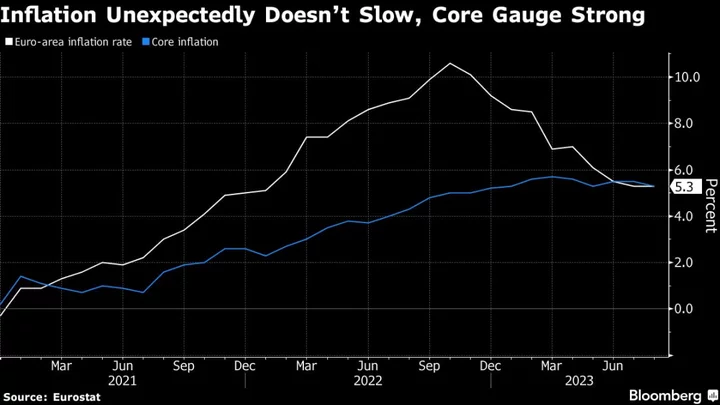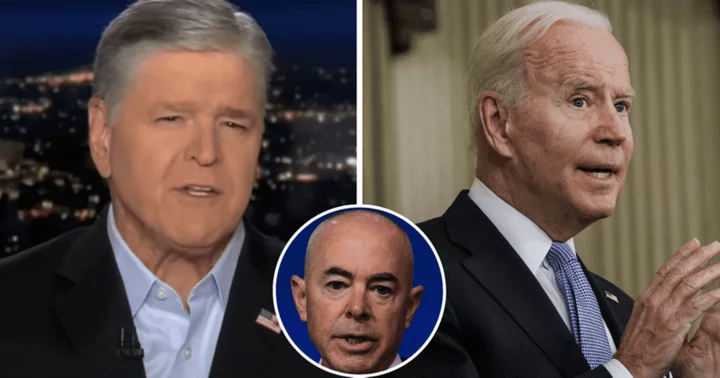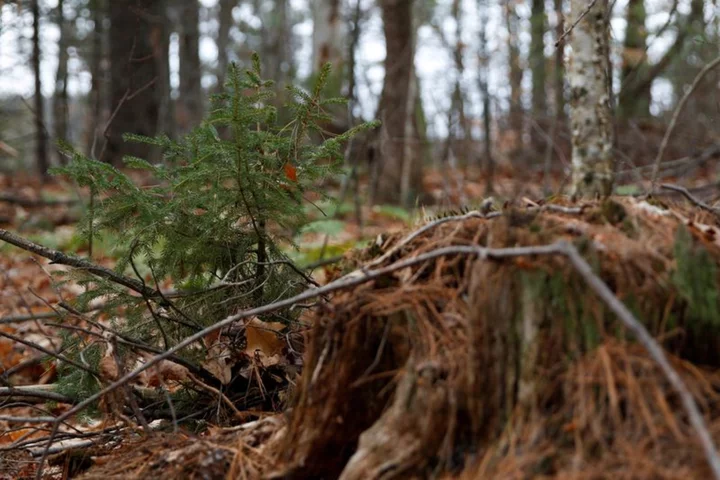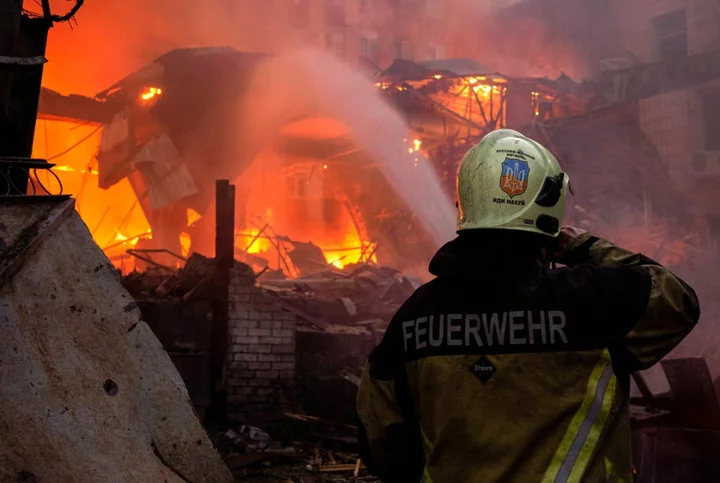
ECB’s Options Remain Open With Rate Peak Close, Villeroy Says
The European Central Bank hasn’t yet decided what to do this month but the end of its interest-rate
2023-09-01 15:45

Recovery efforts are focused on power restoration in Florida communities as sweltering heat moves in after Hurricane Idalia
Crews in Florida will keep working to restore power and clear debris Friday after Hurricane Idalia flooded thousands of homes along its west coast -- and outages have left thousands waking up in the dark as scorching heat has set in.
2023-09-01 15:21

Fox News anchor Sean Hannity slammed for claiming Joe Biden is 'losing it' after bizarre moment with Alejandro Mayorkas
Fox News anchor Sean Hannity received backlash online for criticizing President Biden's interation with the DHS Secretary Alejandro Mayorkas
2023-09-01 14:53

Carbon credit market confidence ebbs as big names retreat
By Susanna Twidale and Sarah McFarlane LONDON Voluntary carbon markets have shrunk for the first time in at
2023-09-01 14:27

Kim Kardashian slammed for flaunting 'fancy' leopard print coat as she shares vacation memories with daughter North West
Kim Kardashian has been seen posting most on social media about her 9-year-old, making fans believe that she is more emotionally attached to North
2023-09-01 14:22

What are gynaecological cancers and how can you prevent them?
September is Gynaecological Cancer Awareness Month, which sees charities joining together to put the spotlight on the range of cancers that start in the female reproductive system. There are five main types of gynaecological cancer – cervical, ovarian, vaginal, vulvar and uterine (or womb) – plus fallopian tube cancer, although this is very rare. Around 22,000 women are diagnosed with a gynaecological cancer each year in the UK, of which 21 die every day, according to charity The Eve Appeal. However, some of these cases are preventable, and with the right treatment, many gynaecological cancers have high survival rates. Here, experts answer some key questions about the prevention and treatment of gynaecological cancers. What are the symptoms of gynaecological cancers? “The symptoms of gynaecological cancers can vary,” says gynaecologist Oudai Ali from New Victoria Hospital. “But some common signs to watch out for include abnormal vaginal bleeding, pelvic pain or discomfort, unusual vaginal discharge, new vulval lump or ulcer and changes in urinary or bowel habits.” If you’ve noticed any of these signs, follow the ‘if in doubt, check it out’ rule, Ali says: “It’s crucial for patients to consult their GP if they experience any of these symptoms, as early detection can significantly improve treatment outcomes.” Severe ongoing bloating and feeling full very quickly, unintentional weight loss and fatigue are also indications it’s a good idea to get things checked out. Are regular screenings important for gynaecological health? Routine screening programmes are not available for all types of gynaecological cancer. However, where they are available – such as cervical smear tests – attending screenings can be life-saving. “Regular screenings, such as smear tests and HPV (human papillomavirus) tests, are vital for the early detection of cervical cancer and can prevent it at its pre-cancer stage,” says Ali. “Additionally, it’s important for individuals to discuss family history and risk factors with their healthcare provider to determine which screenings are appropriate.” Research shows that cervical cancer risks are higher for people who don’t attend screenings. “Cervical cancer risk is estimated to be 1.7% among women in the UK who don’t attend screenings,” says Mr Andrew Pooley, consultant gynaecologist at New Victoria Hospital. “Other risk factors are related to a higher exposure to HPV, the use of the contraceptive pill for over 10 years, or a weak immune system.” Ali adds: “The age to start screening can vary depending on the type of cancer and a patient’s individual risk factors. Pap smears typically start around age 25.” For cancers where there isn’t a national screening programme, your GP can refer you for blood tests and scans if you are concerned about symptoms. Can gynaecological cancers be prevented? While not all gynaecological cancers can be prevented, there are steps you can take that in some cases may help reduce your risk. “Maintaining a healthy lifestyle, including a balanced diet, regular exercise, and avoiding tobacco, can help,” Ali says. “The HPV vaccine is a powerful tool in preventing certain gynaecological cancers. It protects against several strains of HPV that can lead to cervical, vaginal, and vulvar cancers. It’s recommended for both boys and girls, ideally before they become sexually active, to provide the greatest protection.” Some gynaecological cancers can have a hereditary component, too. “A family history of bowel, breast or ovarian cancer may increase the risk,” Ali explains, which is why it’s important to discuss family medical history at screenings. “They can assess the risk accurately and recommend appropriate screenings or genetic testing if necessary.” This said, anyone can potentially get cancer, so getting any symptoms checked as soon as possible is always key. What are the available treatment options for gynaecological cancers? Treatment options vary depending on the type and stage (from one to four) of cancer. “They may include surgery, chemotherapy, radiation therapy, hormone therapy, targeted therapy, or a combination of these treatments,” says Ali. “The choice of treatment is personalised to each patient’s specific diagnosis and medical history.” Survival rates for the main five gynaecological cancers when diagnosed at stage one range from 75%-95% according to Cancer Research, which further highlights the importance of early detection. New Victoria Hospital has launched its Community Champion Campaign, which will offer free scans and treatment to people across the UK for the sum of £125,000. To apply visit: newvictoria.co.uk/communitychampioninitiative. Read More Charity boss speaks out over ‘traumatic’ encounter with royal aide Ukraine war’s heaviest fight rages in east - follow live Alzheimer’s: How and when to talk to someone about their memory loss As Simon Cowell shares positive therapy experience, how can it help even if you aren’t in crisis? Project launched to bust myth that cancer is a ‘white person’s disease’
2023-09-01 14:22

Mykelti Brown upset over dad Kody's close bond with Aurora after 'Sister Wives’ star took his adopted daughter for ear piercing
Kody has made derogatory remarks about women with pierced ears for years, according to his daughter Mykelti Brown
2023-09-01 13:27

Alzheimer’s: How and when to talk to someone about their memory loss
You may have noticed someone close to you changing – perhaps they are more forgetful, not quite themselves. After a quick search online or a chat with family members or friends, you may be left thinking they’re developing Alzheimer’s. But how do you approach a conversation about dementia when it’s such an emotive topic? “As we get older, we’re all prone to becoming more forgetful, taking longer to remember certain things, getting distracted more easily or struggling to perform several tasks at once,” says head of knowledge at Alzheimer’s Society, Dr Tim Beanland. “These are common signs of getting older, but there is still a very sharp distinction between normal ageing and dementia.” Symptoms that may worry you “Symptoms of dementia gradually get worse over time,” Beanland explains, “and can appear as memory loss, confusion, needing help with everyday tasks, problems with language and understanding, or changes in behaviour. Although symptoms typically occur in people aged 65 and over, they can occasionally appear as early as twenty years sooner.” You may be scared Seeing these types of changes is understandably worrying – it’s a reminder of the age and health of those around us. “Noticing what might be dementia symptoms in a loved one can be distressing and confusing, particularly for people who have never dealt with dementia before,” Beanland says. “Both parties may feel nervous or worried about how to address the topic of potential dementia symptoms, and may not know where to begin.” Be open Beanland suggests asking questions like, ‘How are you feeling lately, physically and emotionally?’ Or ‘Do you have any health worries you’d like to talk about?’ It’s important to remember when approaching someone who may be experiencing dementia symptoms to do so gently, calmly and in a reassuring and supportive manner. “People experiencing dementia symptoms may find it difficult, or take a bit longer, to find the words they wish to say,” notes Beanland. “So, allowing them extra time, or giving them gentle prompts, can help them find the words they’re looking for, without highlighting they’ve forgotten something.” Do your research Dementia or Alzheimer’s may not be the only answer. It’s important to remember there are other conditions which can cause similar symptoms to dementia, such as thyroid problems or urinary tract infections, says Beanland. “Try to focus on helping the person see their GP, to find out what is causing the problems they are having. It’s also important to understand that, whether you are experiencing dementia symptoms personally or you’re a concerned loved one, you do not have to face dementia alone. There is support out there for you. “I’d encourage anyone worried about their own or a loved one’s memory to use Alzheimer’s Society’s symptoms checklist. It will help to unlock the vital care and support you need, and give you the precious time needed with your family to plan for the future.” Read More Charity boss speaks out over ‘traumatic’ encounter with royal aide Ukraine war’s heaviest fight rages in east - follow live As Simon Cowell shares positive therapy experience, how can it help even if you aren’t in crisis? Project launched to bust myth that cancer is a ‘white person’s disease’ 10 slick ways to kit out your student digs
2023-09-01 13:17

Ne-Yo's ex-fiancee Monyetta Shaw alleges she broke up with singer due to too many 'threesomes'
'RHOA' star Monyetta Shaw unveiled on a podcast that the breakup with Ne-Yo ensued from his frequent involvement in 'threesomes'
2023-09-01 12:55

Internet dubs Kylie Jenner’s soiled appearance ‘cringe’ as she flaunts toned body in ad campaign video
Some people asked Kylie Jenner to 'take a shower' as she appeared to be covered in dirt in her ad campaign for Acne Studios
2023-09-01 12:47

Ukraine-Russia war live: Putin’s forces pushed back by counteroffensive after ‘largest’ drone strike
Russian president Vladimir Putin’s forces have been pushed back amid Ukraine’s counteroffensive, as deputy defence minister Hanna Maliar reported new “successes” in the south and east. “There have been some successes, in particular in the direction of Novodanylivka-Novoprokopivka,” Ms Maliar said on the Telegram messaging app, referring to two southeastern villages in the Zaporizhzhia region. Novoprokopivka lies further south of the strategic settlement of Robotyne, which Ukraine said on Monday it had liberated. Ms Maliar also said Kyiv’s forces were pressing on with their offensive operations south of the devastated eastern city of Bakhmut, which was captured by Russian troops in May. The battlefield update comes on the same day the UK’s Ministry of Defence said Putin faced the largest attack on Russia since the start of the war, after it was hit by five separate drone strikes overnight on 29 and 30 August. The MoD said explosions were recorded in Moscow, Bryansk, and Ryazan, as well as at Pskov airbase close to the Estonian border. The government added that since many of these drones reached their targets, it “likely means Russian air defence is having difficulty detecting and destroying them”. Read More Putin’s forces pushed back in southern Ukraine – as Zelensky claims new long-range weapon The ‘Vampire’ rocket system helping Ukraine shoot down Russia’s kamikaze drones Ukraine pilot films moment drone flies into Russian truck
2023-09-01 12:28

Gabon coup shows how France's influence on its former territories is disintegrating
When President Leon Mba of Gabon was toppled by the military in 1964, then-French President Charles de Gaulle sprang into action and immediately sent French troops to restore Mba to power.
2023-09-01 12:27
